Abstract
1. We evaluated the relative efficacies and tolerability of various low-dose combinations of nicardipine and propranolol in patients with mild-moderate essential hypertension (DBP Phase V of greater than 90-125 mmHg; WHO Grades I and II) in order to select the best one. 2. Sixty patients completed the double-blind, balanced, randomised three-way cross-over protocol, with each phase lasting 4 weeks, and in which twice daily nicardipine 40 mg or propranolol 80 mg was compared with four twice daily combinations of nicardipine (20 or 30 mg) plus propranolol (40 or 80 mg). 3. At 'peak' effect time (i.e., 2 h post-dosing) all four treatment combinations were significantly more effective than propranolol, with effects ranging from 9-23 mmHg (systolic) and 5-15 mmHg (diastolic). Only the two 30 mg nicardipine combinations with propranolol were more effective than nicardipine monotherapy, further reducing BP by 8-13 mmHg (systolic) and 5-7 mmHg (diastolic); there were no significant differences between them. 4. 'Trough' diastolic pressures were not different between treatments and 'trough' BP control was sub-optimal on all treatments. 5. 70% of patients on nicardipine monotherapy, 33% of those on propranolol monotherapy and 30% of patients during the placebo run-in complained of symptoms. In terms of complaint rates, there was little to choose between the four combinations (27-33%). Serum potassium and creatinine levels were elevated following propranolol monotherapy by 0.19 mmol 1-1 and 6.5 mumol 1-1 respectively (P less than 0.01 for both) and following the nicardipine 30 mg/propranolol 80 mg combination. Nicardipine monotherapy elevated serum T4 levels by an average of 0.57 ng dl-1 (P less than 0.05). 6. The twice daily combination of nicardipine 30 mg plus propranolol 40 mg was therefore the optimum one in terms of its efficacy and tolerability. Further studies need to be performed to test the hypothesis that a higher dose of propranolol might ameliorate troublesome vasodilator side effects. However, none of the treatments studied was ideal for clinical use in the twice daily dosage used in this study.
Full text
PDF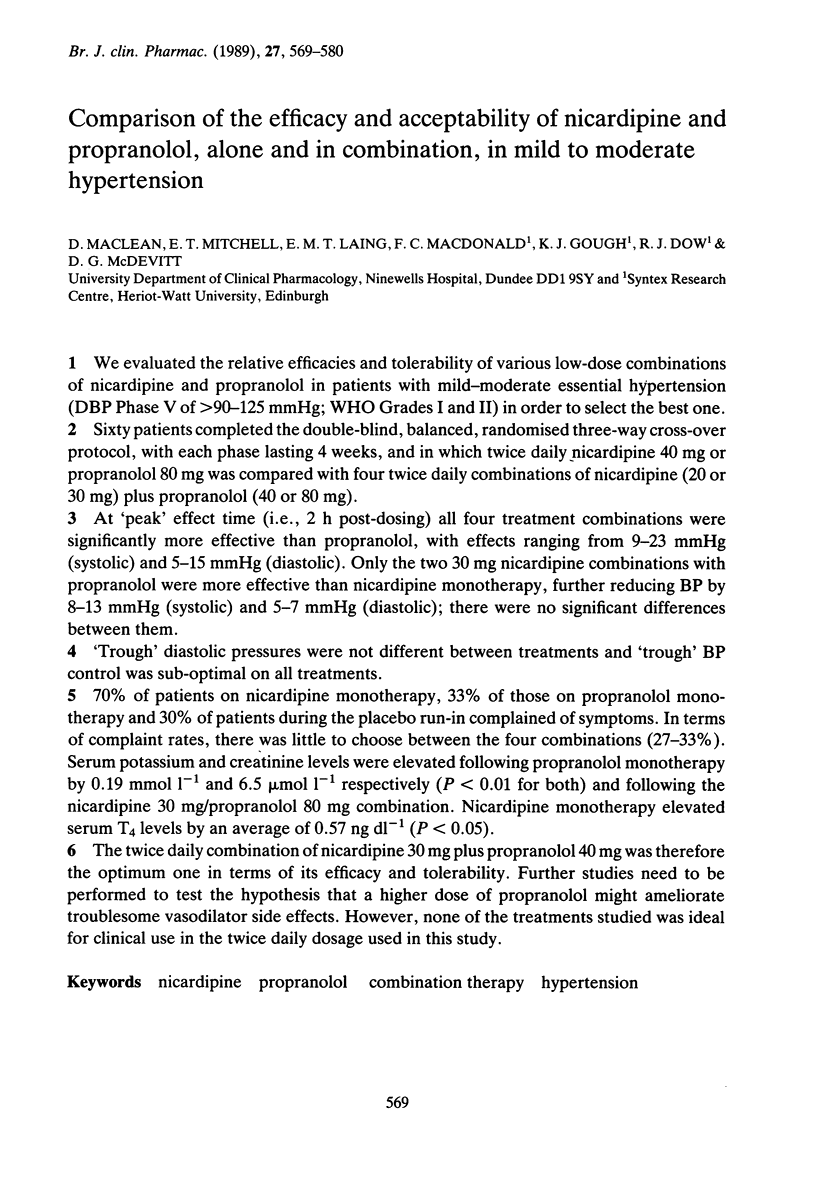
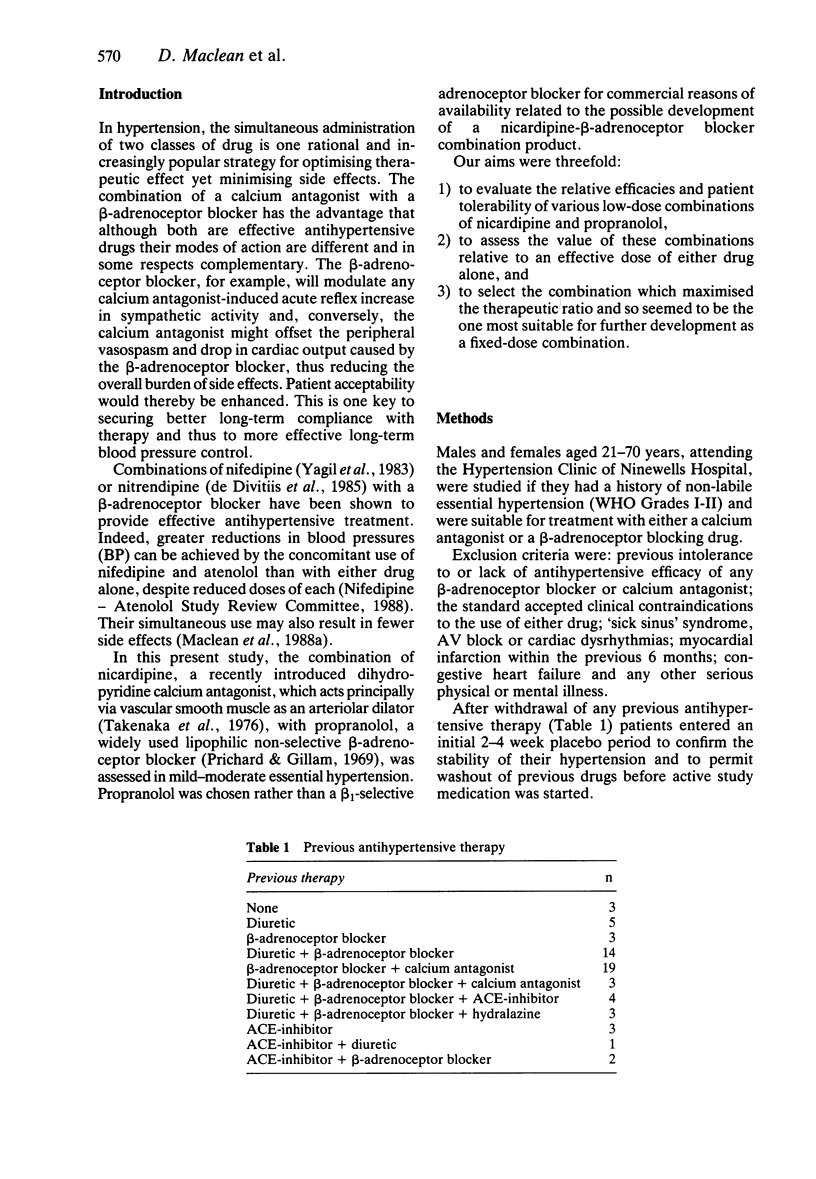
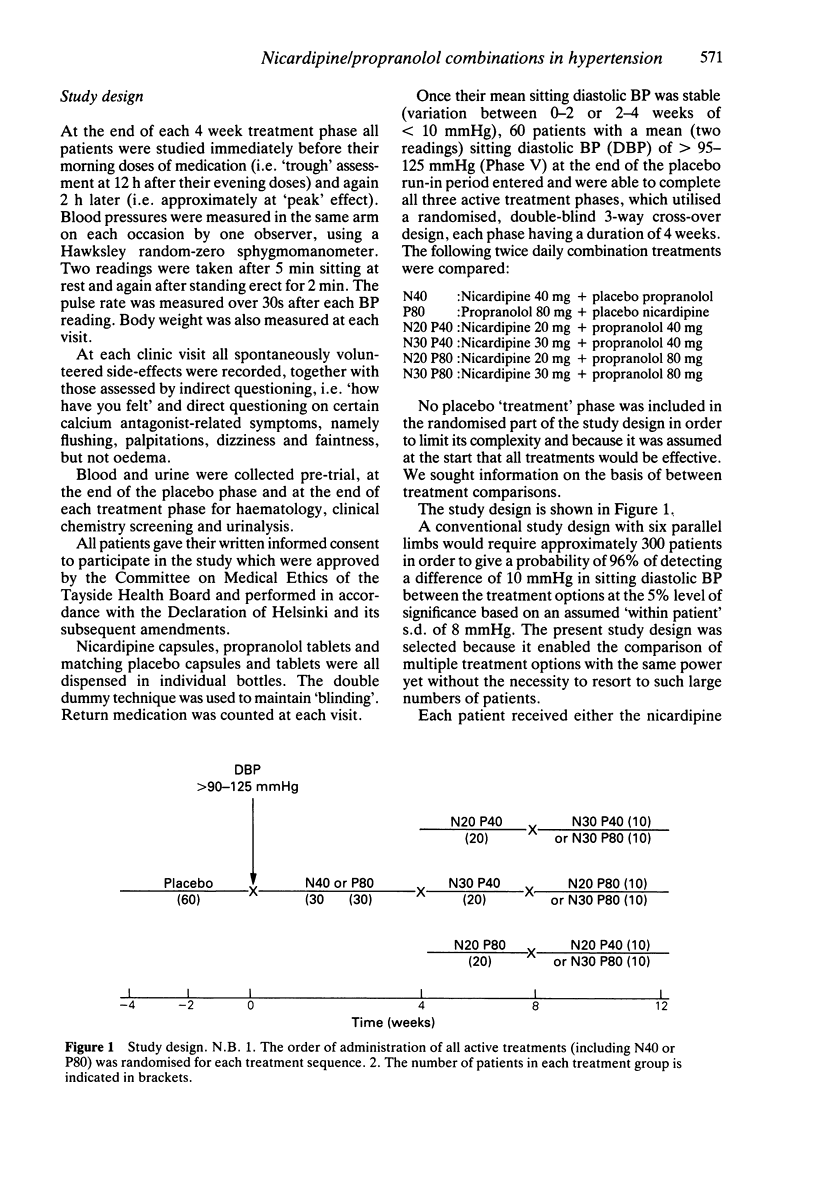
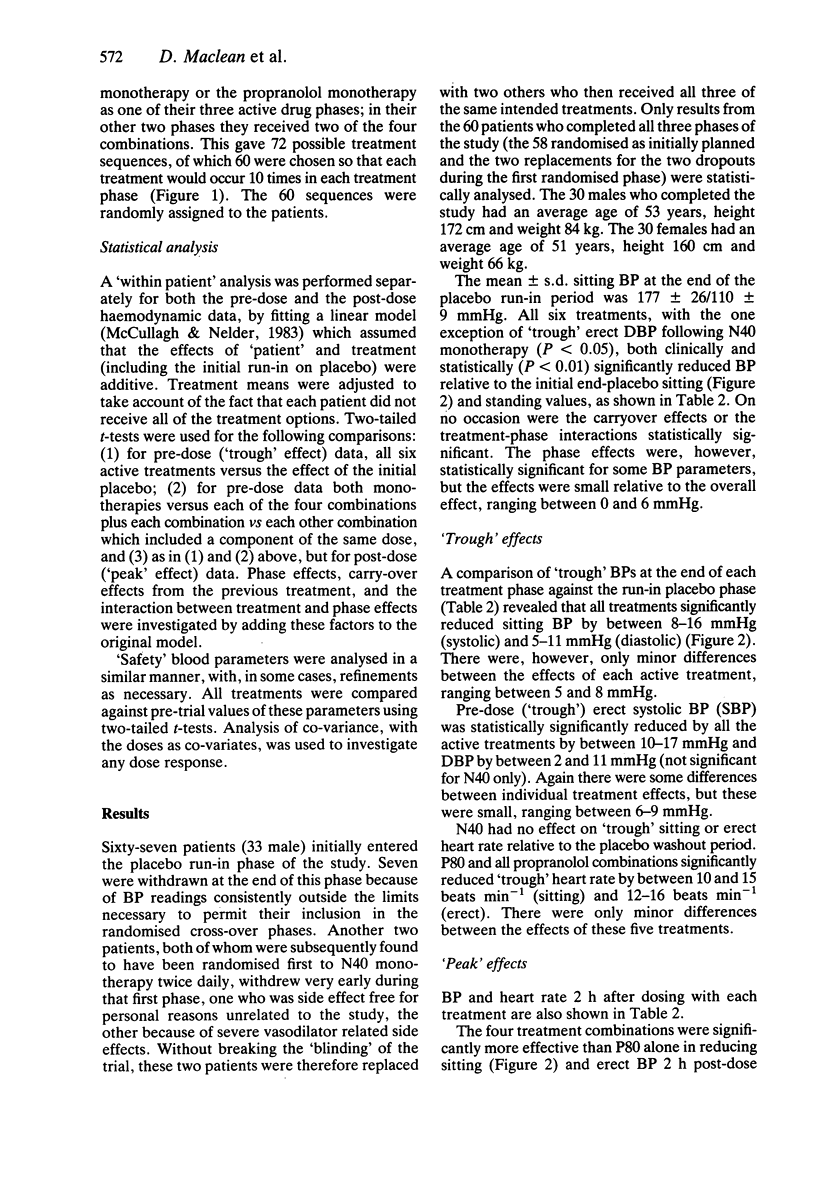
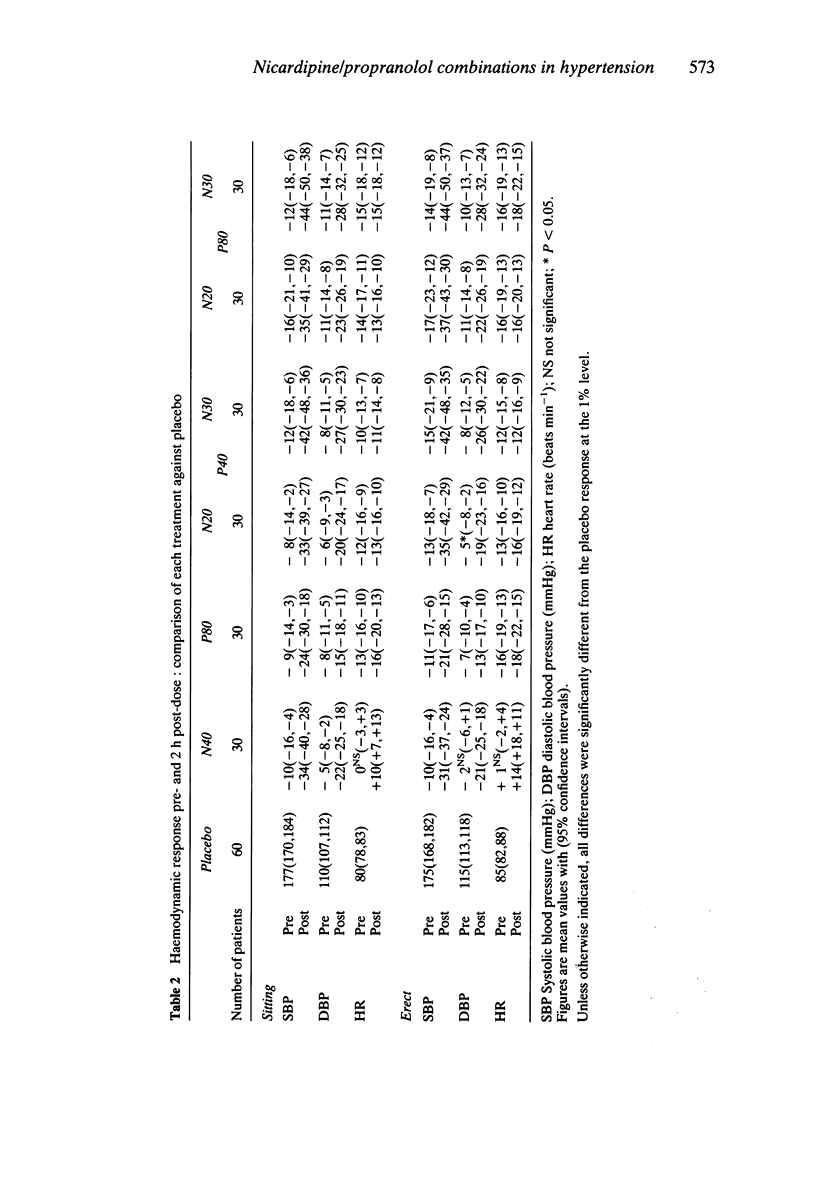
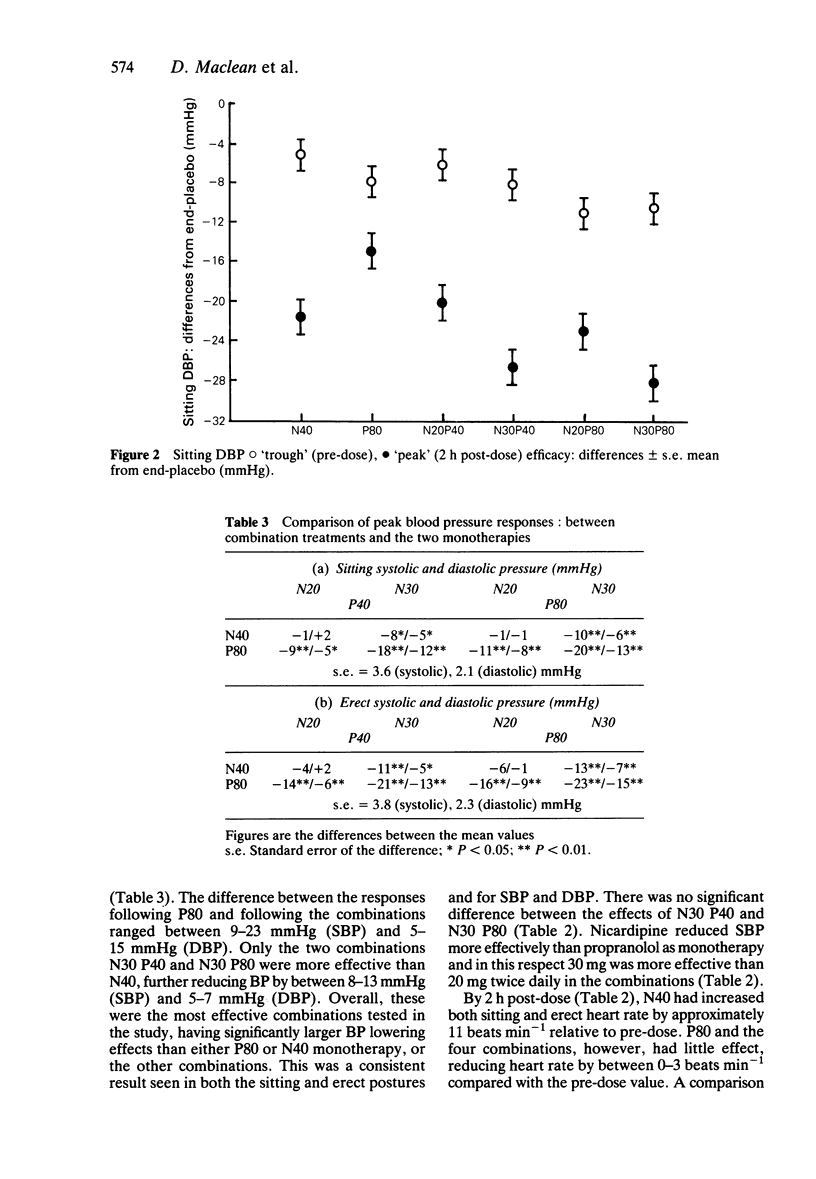
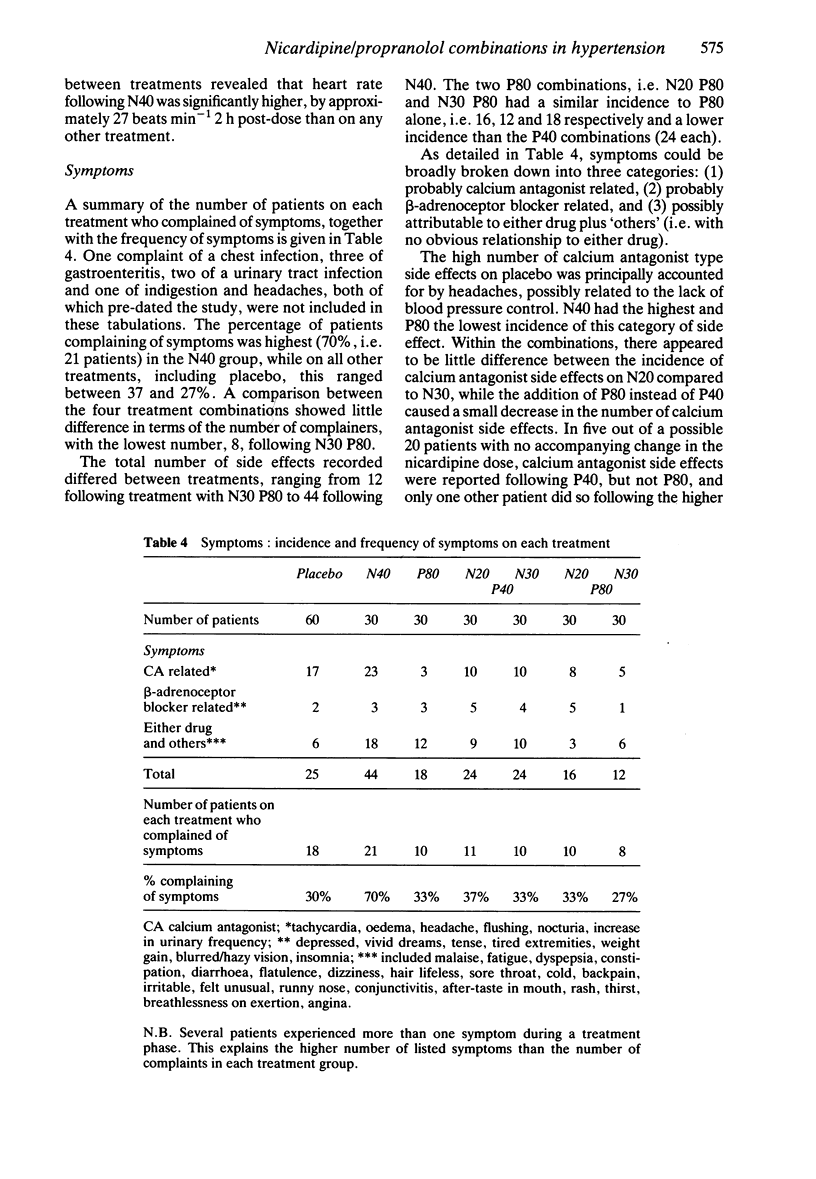
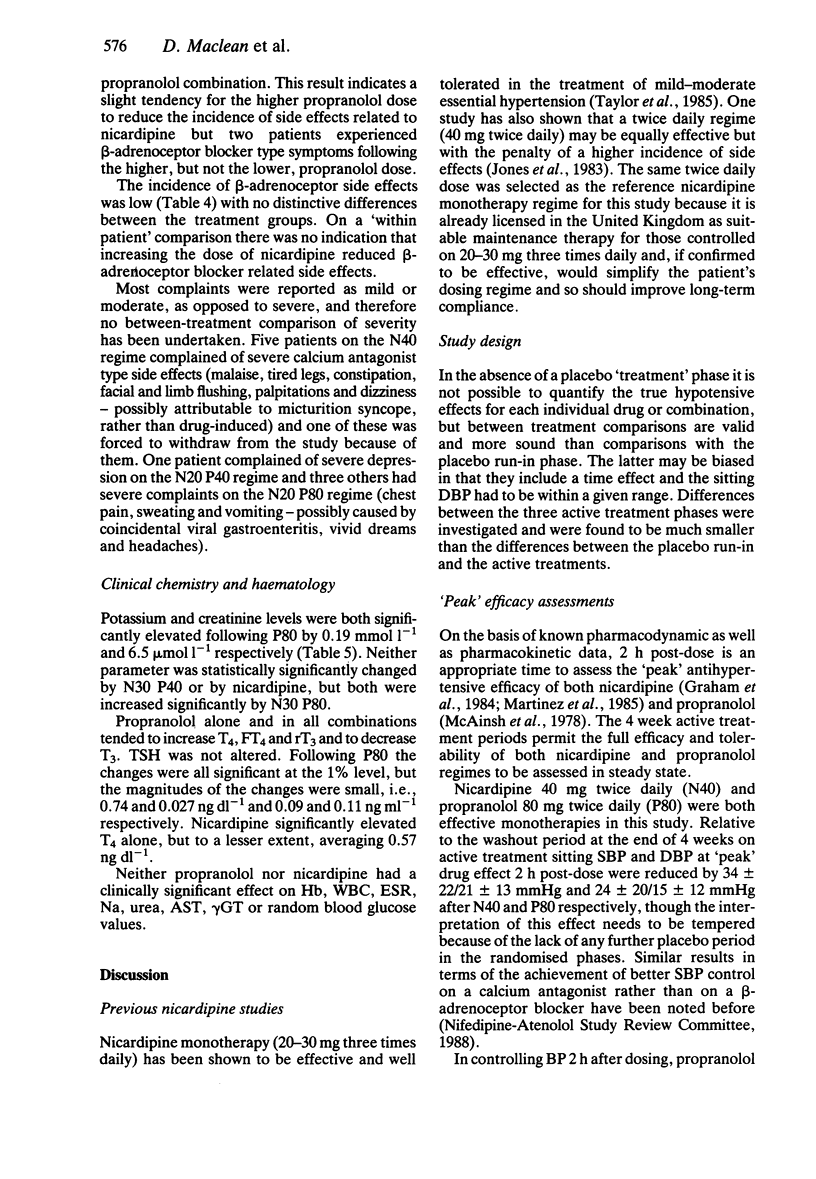
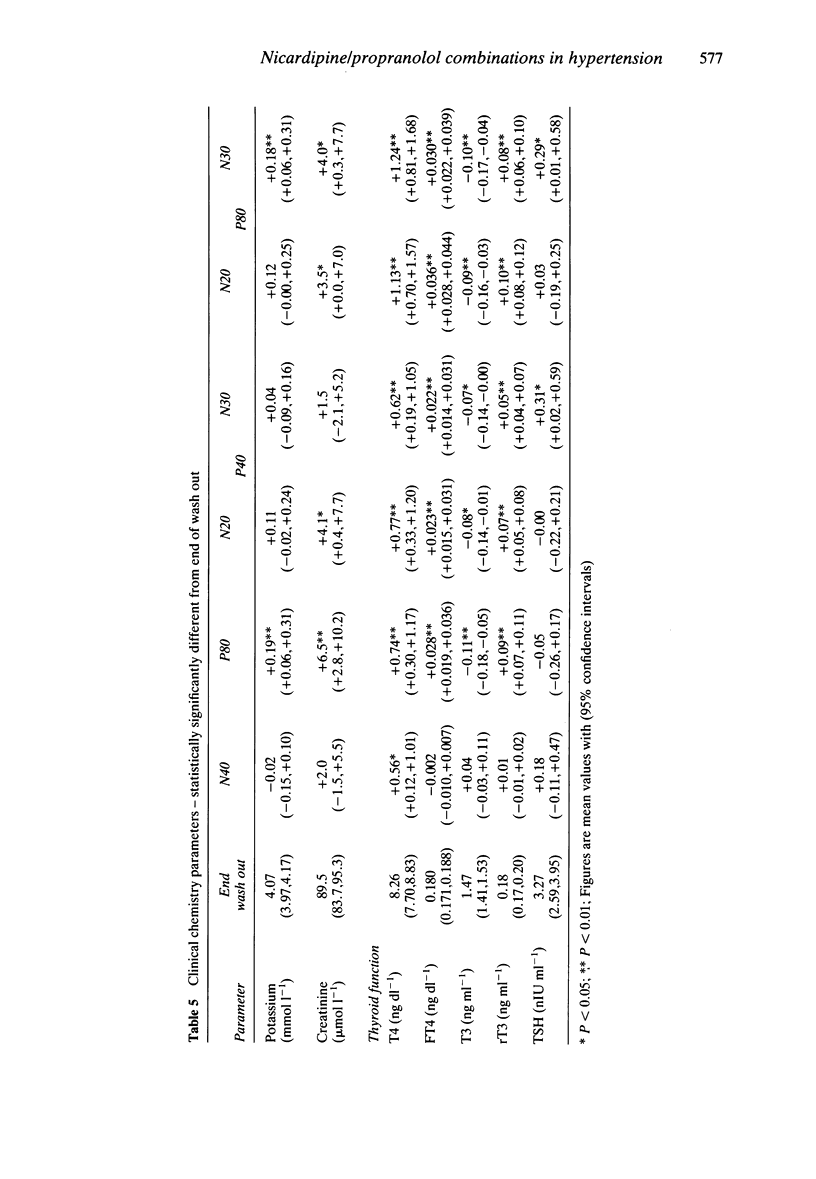
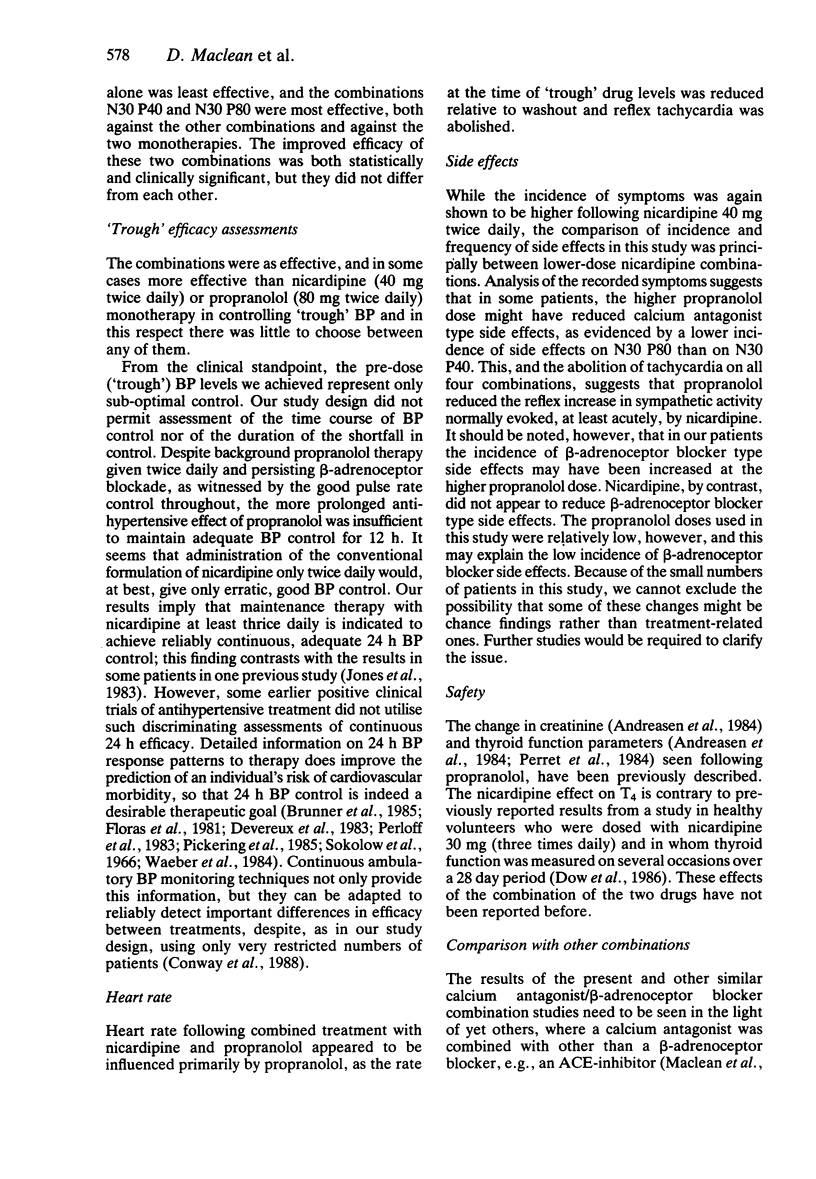
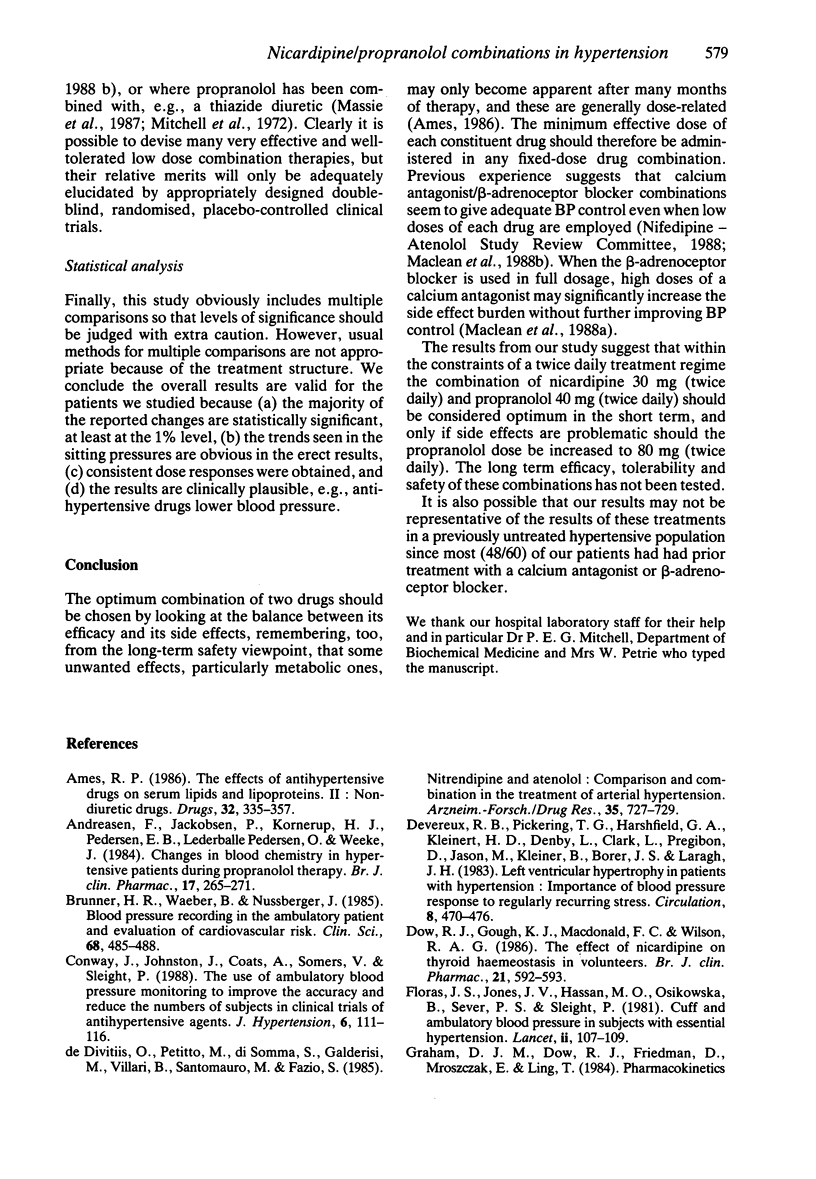
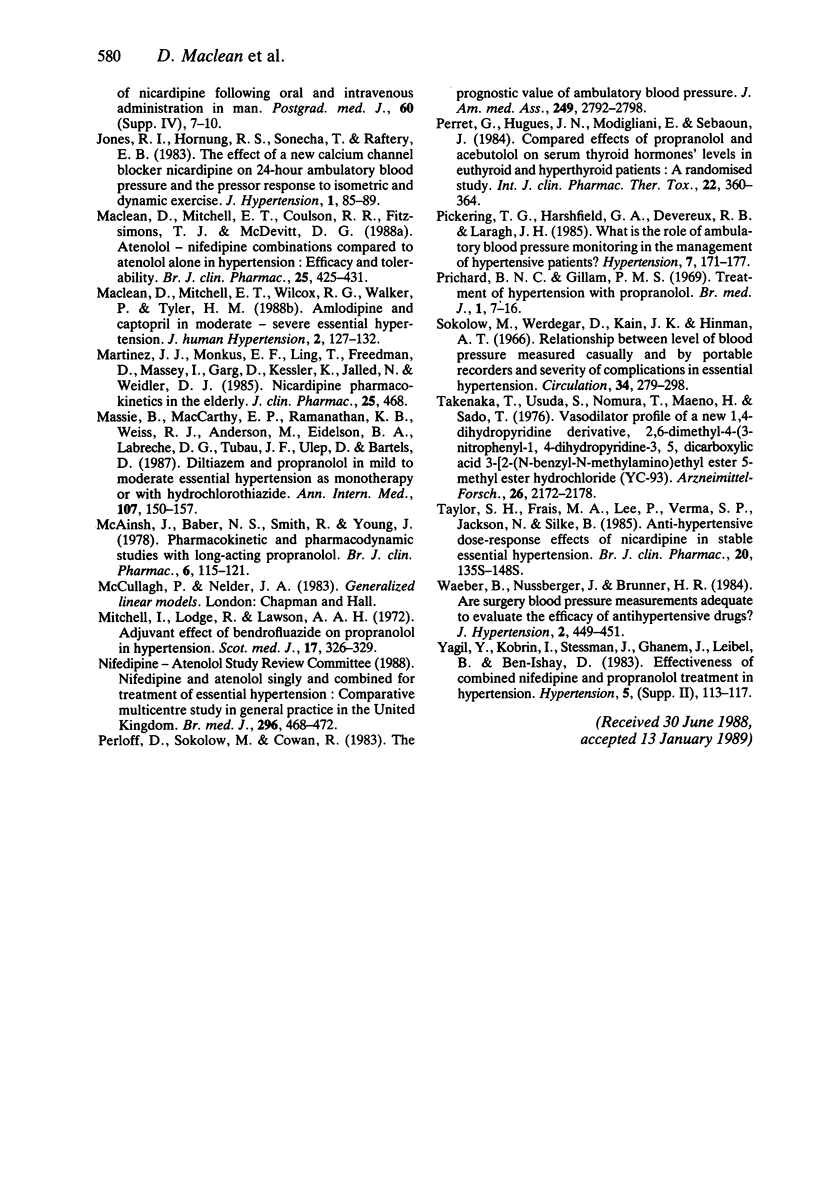
Selected References
These references are in PubMed. This may not be the complete list of references from this article.
- Ames R. P. The effects of antihypertensive drugs on serum lipids and lipoproteins. II. Non-diuretic drugs. Drugs. 1986 Oct;32(4):335–357. doi: 10.2165/00003495-198632040-00003. [DOI] [PubMed] [Google Scholar]
- Andreasen F., Jakobsen P., Kornerup H. J., Pedersen E. B., Pedersen O. L., Weeke J. Changes in blood chemistry in hypertensive patients during propranolol therapy. Br J Clin Pharmacol. 1984 Mar;17(3):265–271. doi: 10.1111/j.1365-2125.1984.tb02341.x. [DOI] [PMC free article] [PubMed] [Google Scholar]
- Brunner H. R., Waeber B., Nussberger J. Blood pressure recording in the ambulatory patient and evaluation of cardiovascular risk. Clin Sci (Lond) 1985 May;68(5):485–488. doi: 10.1042/cs0680485. [DOI] [PubMed] [Google Scholar]
- Conway J., Johnston J., Coats A., Somers V., Sleight P. The use of ambulatory blood pressure monitoring to improve the accuracy and reduce the numbers of subjects in clinical trials of antihypertensive agents. J Hypertens. 1988 Feb;6(2):111–116. [PubMed] [Google Scholar]
- Devereux R. B., Pickering T. G., Harshfield G. A., Kleinert H. D., Denby L., Clark L., Pregibon D., Jason M., Kleiner B., Borer J. S. Left ventricular hypertrophy in patients with hypertension: importance of blood pressure response to regularly recurring stress. Circulation. 1983 Sep;68(3):470–476. doi: 10.1161/01.cir.68.3.470. [DOI] [PubMed] [Google Scholar]
- Floras J. S., Jones J. V., Hassan M. O., Osikowska B., Sever P. S., Sleight P. Cuff and ambulatory blood pressure in subjects with essential hypertension. Lancet. 1981 Jul 18;2(8238):107–109. doi: 10.1016/s0140-6736(81)90296-8. [DOI] [PubMed] [Google Scholar]
- Graham D. J., Dow R. J., Freedman D., Mroszczak E., Ling T. Pharmacokinetics of nicardipine following oral and intravenous administration in man. Postgrad Med J. 1984;60 (Suppl 4):7–10. [PubMed] [Google Scholar]
- Jones R. I., Hornung R. S., Sonecha T., Raftery E. B. The effect of a new calcium channel blocker nicardipine on 24-hour ambulatory blood pressure and the pressor response to isometric and dynamic exercise. J Hypertens. 1983 Jun;1(1):85–89. [PubMed] [Google Scholar]
- Maclean D., Mitchell E. T., Coulson R. R., Fitzsimons T. J., McDevitt D. G. Atenolol-nifedipine combinations compared to atenolol alone in hypertension: efficacy and tolerability. Br J Clin Pharmacol. 1988 Apr;25(4):425–431. doi: 10.1111/j.1365-2125.1988.tb03325.x. [DOI] [PMC free article] [PubMed] [Google Scholar]
- Maclean D., Mitchell E. T., Wilcox R. G., Walker P., Tyler H. M. Amlodipine and captopril in moderate-severe essential hypertension. J Hum Hypertens. 1988 Aug;2(2):127–132. [PubMed] [Google Scholar]
- Massie B., MacCarthy E. P., Ramanathan K. B., Weiss R. J., Anderson M., Eidelson B. A., Labreche D. G., Tubau J. F., Ulep D., Bartels D. Diltiazem and propranolol in mild to moderate essential hypertension as monotherapy or with hydrochlorothiazide. Ann Intern Med. 1987 Aug;107(2):150–157. doi: 10.7326/0003-4819-107-2-150. [DOI] [PubMed] [Google Scholar]
- McAinsh J., Baber N. S., Smith R., Young J. Pharmacokinetic and pharmacodynamic studies with long-acting propranolol. Br J Clin Pharmacol. 1978 Aug;6(2):115–121. doi: 10.1111/j.1365-2125.1978.tb00835.x. [DOI] [PMC free article] [PubMed] [Google Scholar]
- Mitchell I., Lodge R., Lawson A. A. Adjuvant effect of bendrofluazide on propranolol in hypertension. Scott Med J. 1972 Oct;17(10):326–329. doi: 10.1177/003693307201701003. [DOI] [PubMed] [Google Scholar]
- Perloff D., Sokolow M., Cowan R. The prognostic value of ambulatory blood pressures. JAMA. 1983 May 27;249(20):2792–2798. [PubMed] [Google Scholar]
- Perret G., Hugues J. N., Modigliani E., Sebaoun J. Compared effect of propranolol and acebutolol on serum thyroid hormones' levels in euthyroid and hyperthyroid patients: a randomized study. Int J Clin Pharmacol Ther Toxicol. 1984 Jul;22(7):360–364. [PubMed] [Google Scholar]
- Pickering T. G., Harshfield G. A., Devereux R. B., Laragh J. H. What is the role of ambulatory blood pressure monitoring in the management of hypertensive patients? Hypertension. 1985 Mar-Apr;7(2):171–177. doi: 10.1161/01.hyp.7.2.171. [DOI] [PubMed] [Google Scholar]
- Prichard B. N., Gillam P. M. Treatment of hypertension with propranolol. Br Med J. 1969 Jan 4;1(5635):7–16. doi: 10.1136/bmj.1.5635.7. [DOI] [PMC free article] [PubMed] [Google Scholar]
- Sokolow M., Werdegar D., Kain H. K., Hinman A. T. Relationship between level of blood pressure measured casually and by portable recorders and severity of complications in essential hypertension. Circulation. 1966 Aug;34(2):279–298. doi: 10.1161/01.cir.34.2.279. [DOI] [PubMed] [Google Scholar]
- Takenaka T., Usuda S., Nomura T., Maeno H., Sado T. Vasodilator profile of a new 1,4-dihydropyridine derivative, 2,6-dimethyl-4-(3-nitrophenyl)-1,4-dihydropyridine-3,5-dicarboxylic acid 3-[2-(N-benzyl-N-methylamino)]-ethyl ester 5-methyl ester hydrochloride (YC-93). Arzneimittelforschung. 1976;26(12):2172–2178. [PubMed] [Google Scholar]
- Taylor S. H., Frais M. A., Lee P., Verma S. P., Jackson N., Silke B. Anti-hypertensive dose-response effects of nicardipine in stable essential hypertension. Br J Clin Pharmacol. 1985;20 (Suppl 1):135S–138S. doi: 10.1111/j.1365-2125.1985.tb05156.x. [DOI] [PMC free article] [PubMed] [Google Scholar]
- Waeber B., Nussberger J., Brunner H. R. Are surgery blood pressure measurements adequate to evaluate the efficacy of antihypertensive drugs? J Hypertens. 1984 Oct;2(5):449–451. doi: 10.1097/00004872-198410000-00001. [DOI] [PubMed] [Google Scholar]
- de Divitiis O., Petitto M., Di Somma S., Galderisi M., Villari B., Santomauro M., Fazio S. Nitrendipine and atenolol: comparison and combination in the treatment of arterial hypertension. Arzneimittelforschung. 1985;35(4):727–729. [PubMed] [Google Scholar]


